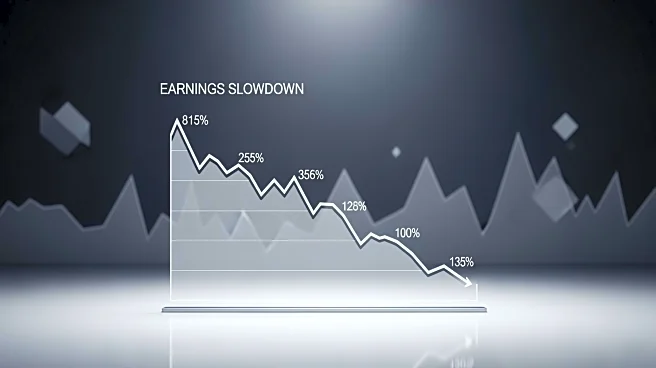What's Happening?
Edenred, a French voucher company, has announced a forecasted slowdown in its annual core profit growth for 2026, leading to a significant drop in its share price. The company expects like-for-like EBITDA growth to range between 2% and 4% in 2026, a decrease
from the minimum 10% growth experienced in the 2025 fiscal year. Analysts at Jefferies have noted the expected downgrades and lack of buyback upgrades as contributing factors to the share decline. Despite this, Edenred projects an annual EBITDA like-for-like growth of between 8% and 12% for 2027 and 2028. J.P. Morgan has commented that while the new targets are encouraging, they imply only minor upgrades to 2027-28 estimates and 1-2% downgrades to 2026 consensus.
Why It's Important?
The forecasted slowdown in Edenred's earnings growth is significant for investors and stakeholders, as it impacts the company's market performance and investor confidence. The anticipated downgrades and lack of buyback upgrades could lead to further volatility in the stock market, affecting investment strategies. The company's performance is crucial for its position in the Europe-wide STOXX 600 index, where it is currently among the bottom performers. The broader implications for the financial sector include potential shifts in investment focus and strategies, particularly in the voucher and corporate services industry.
What's Next?
Edenred's future performance will likely depend on its ability to navigate regulatory frameworks in key markets such as France and Brazil. Investors may require further clarity on these issues before making more constructive decisions regarding the company's stock. The company's projected growth for 2027 and 2028 suggests a potential recovery, but stakeholders will be closely monitoring any developments that could impact these forecasts.
Beyond the Headlines
The slowdown in earnings growth raises questions about the sustainability of Edenred's business model and its adaptability to changing market conditions. The company's reliance on regulatory frameworks in different countries highlights the importance of strategic planning and risk management in maintaining growth and investor confidence.















